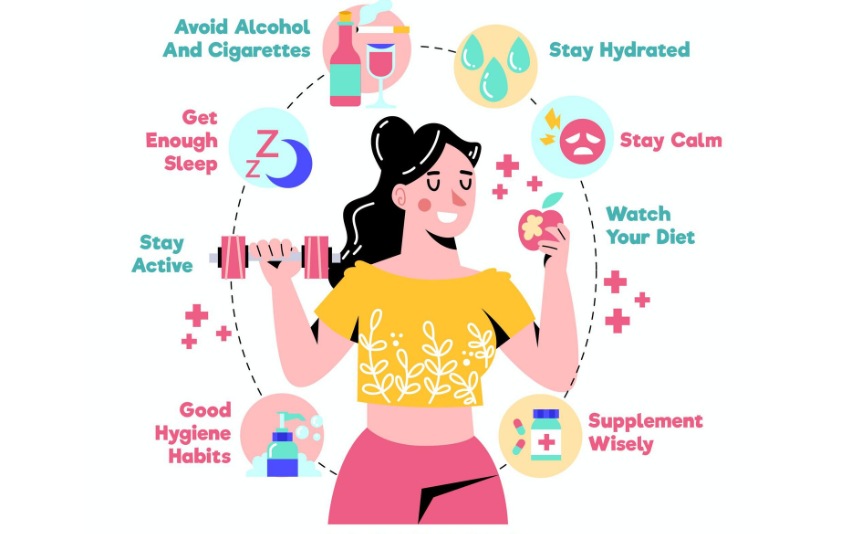Feeling energetic and maintaining stamina throughout the day is something many people struggle with. Low energy, fatigue, and mid-day slumps can affect productivity, mood, and overall wellbeing. Fortunately, there are practical steps you can take to improve stamina and sustain energy naturally.
This article shares actionable tips that combine nutrition, movement, sleep, and lifestyle habits. Following these strategies can help you feel more alert, perform better at work or home, and enjoy daily activities without exhaustion.
Understand The Causes Of Energy Drops
Energy dips can occur for several reasons. Understanding them helps you address the problem effectively.
Common causes include
- Skipping meals or having unbalanced nutrition
- Dehydration
- Lack of quality sleep
- Sedentary lifestyle
- Stress and mental fatigue
- Overconsumption of caffeine or sugar
By identifying the triggers for your energy drops, you can make small but meaningful adjustments.
Prioritise Balanced Nutrition
What you eat directly impacts your stamina. Balanced meals provide steady energy rather than spikes and crashes.
Tips for better nutrition
- Eat regular meals with protein, healthy fats, and complex carbohydrates
- Include foods rich in iron, magnesium, and B vitamins, which support energy production
- Avoid refined sugar and highly processed snacks that cause energy crashes
- Keep healthy snacks on hand, such as nuts, seeds, fruit, or yoghurt
A well-rounded diet fuels your body efficiently and helps maintain consistent energy throughout the day.
Stay Hydrated
Dehydration is a common and often overlooked cause of fatigue. Even mild dehydration can reduce stamina and cognitive performance.
Hydration tips
- Drink water consistently throughout the day
- Include water-rich foods like vegetables, fruits, and soups
- Limit excessive caffeinated drinks, as they can increase dehydration
- Pay attention to thirst and urine colour as indicators of hydration
Proper hydration supports circulation, nutrient delivery, and energy production in the body.
Incorporate Regular Physical Activity
Exercise may seem counterintuitive when feeling tired, but regular activity actually increases stamina and reduces fatigue.
Practical exercise ideas
- Start the day with light stretching or a short walk
- Include moderate cardio, such as brisk walking, cycling, or swimming
- Add strength training to improve muscle efficiency and overall endurance
- Use short movement breaks during work or study to boost circulation
Consistent exercise improves cardiovascular health, strengthens muscles, and helps your body use energy more effectively.
Manage Sleep And Rest
Sleep quality has a direct effect on stamina and daytime energy levels.
Tips for better sleep
- Maintain a regular sleep schedule, going to bed and waking up at the same time
- Aim for seven to nine hours of restful sleep each night
- Create a sleep-friendly environment: dark, quiet, and cool
- Avoid screens and stimulating activities before bedtime
Adequate sleep enhances recovery, mental clarity, and physical energy, reducing daytime slumps.
Control Stress Levels
Chronic stress can drain energy and reduce stamina. Managing stress is essential for sustained performance and wellbeing.
Stress management techniques
- Practise mindfulness or meditation for a few minutes daily
- Take short breaks during work to prevent mental fatigue
- Engage in hobbies or leisure activities that relax you
- Consider breathing exercises or gentle yoga to calm the nervous system
By reducing stress, your body can focus energy on physical and mental tasks, improving overall stamina.
Plan Energy-Friendly Routines
How you organise your day can impact stamina. Efficient routines prevent unnecessary energy dips.
Practical tips
- Schedule demanding tasks for when you naturally have the most energy
- Break work into smaller, manageable segments with short rest periods
- Stand or walk during phone calls or meetings
- Avoid multitasking that can cause mental fatigue
Structuring your day around your natural energy patterns helps maintain productivity and prevents burnout.
Include Energy-Supporting Supplements If Needed
While food should be the primary source of nutrients, certain supplements can support stamina when necessary.
Options to consider
- Iron or vitamin B complex for those with deficiencies
- Magnesium for muscle energy and relaxation
- Omega three fatty acids for overall health and mental energy
Always consult a healthcare professional before starting any supplements to ensure safety and suitability.
Limit Energy Drainers
Some habits can sap stamina and lead to frequent energy dips.
Common energy-draining habits
- Excessive caffeine or sugar intake
- Sitting for long periods without movement
- Overworking or skipping breaks
- Consuming heavy or processed meals that slow digestion
Replacing these habits with energy-supporting practices will make stamina improvements more effective.
Track Progress And Adjust
Monitoring your energy levels can help identify patterns and determine what works best.
Tracking tips
- Keep a simple journal of meals, activity, sleep, and energy levels
- Note times when energy dips occur and possible causes
- Adjust routines, meals, or exercise based on observations
- Celebrate improvements to stay motivated
Tracking allows for personalised adjustments, ensuring your strategies have the maximum impact.
Final Thoughts
Improving stamina and preventing energy drops does not require extreme measures or complex routines. Simple, consistent practices in nutrition, hydration, exercise, sleep, stress management, and daily planning can significantly enhance overall energy levels.
Start with small changes, such as incorporating short walks, drinking enough water, or adjusting meal balance. Over time, these habits compound to improve endurance, mental clarity, and overall wellbeing.
Remember that sustainable energy comes from a combination of lifestyle choices rather than quick fixes. With a mindful approach, it is possible to maintain high energy levels throughout the day, feel more productive, and enjoy a healthier lifestyle.


